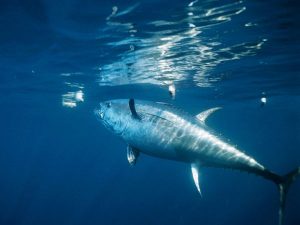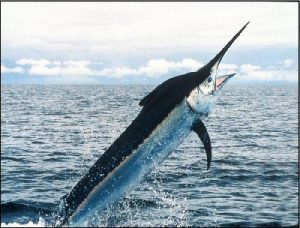MIAMI – July 25, 2011 – A new study by top global fisheries experts presents an alarming assessment of several economically important fish populations. The analysis of 61 species of “scombrids,” which include tunas, bonitos, mackerels and Spanish mackerels, and billfishes, which includeswordfish and marlins, classified seven as threatened with extinction and four as “near threatened” for the IUCN Red List of Threatened Species.

University of Miami Rosenstiel School of Marine & Atmospheric Science associate professor, and assistant director of NOAA’s Cooperative Institute for Marine and Atmospheric Studies (CIMAS) David Die and colleagues scientifically evaluated the species population and conservation status under the IUCN Red List Categories and Criteria, which is the most widely accepted system for classifying extinction risk at the species level.
“The IUCN assessments provide us with a different view of the conservation status of marine resources, when compared to that provided by fishery management organizations,” said Die, who has studied highly migratory tuna and billfish for more than 12 years.
Die conducts research on highly migratory tunas and billfish and regularly contributes to assessments of Atlantic billfish and Atlantic tropical tunas. He contributed information on abundance trends and biological parameters for the Atlantic species of large tunas and billfish to this recent IUCN review study.
Of the 61 known species, seven are classified in a “threatened” category, being at serious risk of extinction. Four species are listed as “near threatened” and nearly two-thirds have been placed in the “least concern” category.

According to the IUCN, there is growing concern that in spite of the healthy status of several epipelagic (those living near the surface) fish stocks some scombrid and billfish species are being heavily overfished, and there is a lack of resolve to protect against overexploitation driven by high prices.
Global fish populations are under pressure from overfishing, pollution, habitat degradation, and disease. The U.N. Food and Agriculture Organization (FAO) estimates that 25 percent of the world’s commercially important marine fish stocks were overfished or depleted.
Scombrids and billfishes are found throughout the world’s oceans, primarily in tropical and temperate coastal and marine regions, and vary greatly in size and lifespan. The largest billfish, the Blue Marlin, and largest scombrid species, the Atlantic Bluefin, can grow to more than four meters (31 feet) long. In contrast, the smallest scombrid species, the Indian Mackerel, only grows to a maximum of 31 centimeters (~ 1 foot).
The health of ocean fisheries is assessed in several different ways. The IUCN review seeks to identify species threatened by extinction where as fisheries management evaluations focus on a population’s sustainability in the face of exploitation.
“Our study reaches similar conclusions to those from the FAO,” said Die. “Approximately one quarter of the worldwide fish stocks and species of “scombrids” are in an undesirable state of sustainable exploitation or conservation.”
The study, titled “High Value and Long Life—Double Jeopardy for Tunas and Billfishes,” was published in the July 15 issue of the journal Science.
About the University of Miami’s Rosenstiel School
The University of Miami’s mission is to educate and nurture students, to create knowledge, and to provide service to our community and beyond. Committed to excellence and proud of the diversity of our University family, we strive to develop future leaders of our nation and the world. Founded in the 1940’s, the Rosenstiel School of Marine & Atmospheric Science has grown into one of the world’s premier marine and atmospheric research institutions. Offering dynamic interdisciplinary academics, the Rosenstiel School is dedicated to helping communities to better understand the planet, participating in the establishment of environmental policies, and aiding in the improvement of society and quality of life. For more information, please visit www.rsmas.miami.edu.
#30#
MEDIA CONTACTS:
Barbra Gonzalez
305-421-4704
Andrew DeChellis
305-421-4473

